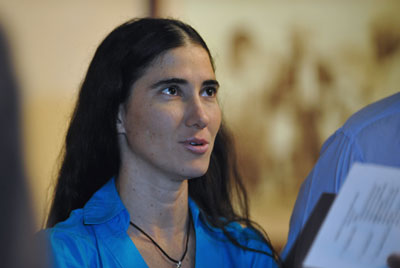The response from Cuban officials did not take anyone by surprise. Prominent Cuban blogger Yoani Sánchez had been, once again, denied permission to leave her country after she was granted a visa by the Brazilian Embassy in January to attend a film festival. “I feel like a hostage kidnapped by someone who doesn’t listen nor provide explanations. A government with a ski mask and a gun in a holster,” tweeted Sánchez on Friday after the Cuban government denied her request to travel to Brazil. It was, according to the blogger, the 19th time Cuban officials have turned down her request to leave the island. As in the past, officials gave no reason for the rejection.
Brazilian filmmaker Dado Galvao announced Tuesday that he was postponing the premiere of the documentary “Connection Cuba-Honduras,” a movie about press freedom in both countries, in solidarity with the Cuban blogger, who participated in the film. Brazilian President Dilma Rousseff, who visited Cuba last week and declined to meet with Sánchez or any dissidents, spoke to reporters before Cuba denied the blogger permission to leave the country. “Brazil gave the visa to the blogger. The rest is not a matter for the Brazilian government,” Rousseff said at the time.
Sánchez’s work is well known outside Cuba. She has received several international awards, including Columbia’s University’s Maria Moors Cabot Award for excellence in Latin American reporting, and she blogs regularly for the U.S.-based Huffington Post. Sánchez also gained a measure of fame when President Barack Obama responded to a written questionnaire she sent to the White House in November 2009.
Sánchez has not only been denied permission to travel abroad but has suffered official harassment for her work. In early November 2009, Sánchez and two other independent Cuban bloggers were detained, harassed, and assaulted by state security agents on their way to a peaceful march in Havana. Sánchez has also been the victim of smear campaigns in Cuba’s state media, which have described her as a “cybermercenary” at the service of foreign governments.
A vibrant and enthusiastic independent blogging community has emerged in Cuba in the past few years, according to CPJ research. The bloggers, who face severe legal, economic, and technological limitations, are mostly young and from a variety of professions. They critically examine the issues that Cubans face daily: food shortages, health care, education, housing problems, and the lack of Internet access, a 2009 CPJ special report found.
Free press advocates and Cuban journalists point to Sánchez as a pioneer in this evolving community. Sánchez, who started blogging in April 2007, was the first to write under her own byline. Her blog, Generación Y, and several other Cuban blogs are hosted by the German-based portal Desde Cuba (From Cuba), a place where, as its introduction says, “citizen journalists” can offer “opinions that don’t have room in official Cuban outlets or any other publication that is conditioned by political requirements.”
Rousseff’s first visit to Cuba as president had raised expectations among some independent reporters, bloggers, and political dissidents that she would speak about human rights on the island. But the Brazilian leader stayed away from the topic, sticking instead to the trip’s key mission of developing trade and boosting Cuba’s economy. Sánchez wrote a blog entry prior to her visit, in which she expressed hope that Rousseff’s behavior would be “consistent with the clamor for democracy, instead of opting for a complicit silence before a dictatorship.” But Rousseff’s visit learly showed that Latin American leaders are still reluctant to address Cuba’s grave human rights violations when they travel there.
